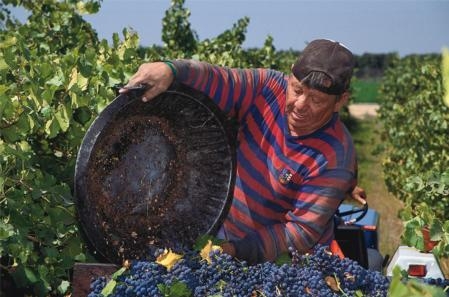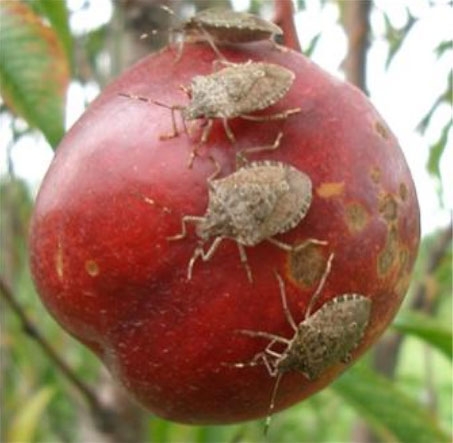Posts Tagged: Stephen Vasquez
Heat wave takes a toll on San Joaquin Valley agriculture
Six consecutive days of San Joaquin Valley temperatures topping out over the 100-degree mark are impacting agricultural production, reported Bob Rodriguez in the Fresno Bee.
Rodriguez talked to UC Cooperative Extension farm advisors to learn about the recent hot weather's effect on tree crops and grape vines.
"Trees and plants just seem to shut down when it gets this hot," said Kevin Day, University of California Cooperative Extension advisor in Tulare County. "And the fruit just doesn't ripen."
Grape growers face similar challenges when the mercury rises.
"Instead of producing sugar and enlarging the berries, the vines just maintain," said Stephen Vasquez, UCCE advisor in Fresno County, viticulture.
The high temperature around the Valley is expected to be about 101 today. More pleasant weather begins Saturday, when temperatures return to normal for this time of year, the mid- to upper 90s.

When the weather gets really hot, grapes go into survival mode.
Fresno County increases funding for UCCE
The Fresno County Board of Supervisors agreed to a 2 percent increase over the UC Cooperative Extension budget request for the 2012-13 fiscal year, according to an article in The Business Journal.
The 2 percent increase follows several years of budget cuts. Cooperative Extension expenses for the 2012-13 year are estimated at $433,572. The county’s contribution is $294,796.
“Our budget probably won’t change,” said Stephen Vasquez, UCCE Cooperative Extension advisor and co-director. But it will be tight, he said.
In fact, UCCE in Fresno County faces another budget issue. A trust fund developed by grower donations that helped subsidize UCCE is running out.
According to another story published in The Business Journal, Fresno County Supervisor Phil Larson has agreed to work with UCCE to develop a new trust fund. Acting as a private individual and not in his capacity as supervisor, Larson has planned a luncheon meeting June 25 at the Downtown Club in Fresno. Various agricultural organizations will be invited to discuss how to start a new trust fund.
Shift toward hiring through farm labor contractors continuing
A Bakersfield farming cooperative will lay off 2,100 permanent seasonal workers and instead hire a labor force through farm labor contractors, reported Jill Cowan in the Bakersfield Californian. The shift toward hiring seasonal workers through farm labor contractors is not new, said University of California Cooperative Extension specialist emeritus Howard Rosenberg, who has studied agricultural labor management for decades.
"(Use of farm labor contractors) has grown from the low 20 percents, to now over 40 percent," Rosenberg said, "and some people would say that it's now over 80 percent."
He said farm labor contractors can help growers avoid "transaction costs for hiring and firing." Employing middlemen who are theoretically experts at "dealing with the complex regulatory environment" is a way of outsourcing some of an organization's management burden.
Agricultural leader Ron Tyler dies
Register Pajaronian
Ron Tyler, the director of UC Cooperative Extension in Santa Cruz County who retired in 1991, has passed away.
“I knew him for about 34 years and he was very dedicated to the ag industry, first being in his profession as the agricultural extension adviser for many years,” Santa Cruz County Farm Bureau executive director Jess Brown said. “In that role, not only did he interact with people in agriculture, but farmed and gave them advice.”
Stink bugs pose noxious challenge
The Business Journal
Native stink bugs don’t pose a great threat to local farmers because they have natural predators. But an invasive species that has wreaked havoc on some mid-Atlantic fruit orchards appears to be flitting toward the Golden State’s breadbasket.
“It’s spreading pretty rapidly,” said Walt Bentley, an entomologist with the University of California’s Integrated Pest Management Program. “Last year it seemed to have one of those population explosions.”
The threat to grapes is of critical concern in the leading grape-growing region in the nation. Stephen Vasquez, viticulture farm advisor for UC Cooperative Extension in Fresno, said stink bugs could wind up crushed by presses at wineries and “contribute to off flavors in the wine.”
Stink bugs also are a nuisance to homeowners, clustering in attics and hiding between any slender space, the way cockroaches do.
“As it gets cold they will start to overwinter in people’s houses. They just haven’t become established yet. I suspect it’s just a matter of time,” Vasquez said.
Colorado cantaloupe listeria outbreak affects California growers
The Colorado farm linked to a deadly listeria outbreak last fall is 1,300 miles away, but the tragedy changed a way of life in Mendota, Calif., the Central Valley farm town that proudly calls itself the Cantaloupe Center of the World, said an article in the Los Angeles Times by Diana Marcum.
This would normally be the season when farmers plan the summer crop that in good years is valued at nearly $200 million, according to the California Cantaloupe Advisory Board. Instead, they are cutting acreage and scrambling for ways to reassure a nervous public that cantaloupes are safe to eat.
This month the UC Center for Produce Safety will host a closed-door symposium in San Diego for cantaloupe growers, shippers, agricultural researchers, government regulators and others to create guidelines for best growing practices.
"The main question will be, 'What are the gaps in our knowledge?'" said Bonnie Fernandez-Fenaroli, executive director of the UC Davis-based center. "Do we need to do research or is it a matter of the cantaloupe industry implementing and enforcing best practices?"
UCCE director in Tulare County takes Kings County reins
Lewis Griswald, Fresno Bee News Blog
Tulare County UC Cooperative Extension Director Jim Sullins will also be director of the Kings County UCCE office. Longtime Kings County UCCE director and 4-H youth advisor Peggy Gregory retired at the end of the year. She served 37 years with the University, including 20 in Kings County.
Grape growers fend off thieves, pests
Fresno Business Journal
Pests and thieves can cost grape growers a great deal of money and headaches. That’s why the two issues were addressed along with other important topics at the UC Cooperative Extension San Joaquin Valley Grape Symposium held Wednesday in Easton.
UCCE viticulture farm advisor Stephen Vasquez gave an update on glassy-winged sharpshooters and Pierce's disease. He said that recent catches of sharpshooters are concerning since they have been found near a major riparian corridor that has had a historically low level of Pierce’s disease.
Exotic stink bug threatens nearly nationwide damage
Another pest has been added to the list of exotic insects that dishearten California farmers. The brown marmorated stink bug, a destructive native of Asia, has been seen this spring in 33 states, including California, Oregon and Washington, according to the San Francisco Chronicle.
"All that we do know for certain is that a tremendously large population went into overwintering in fall 2010. So, if they survived, there could be a very large population emerging in the spring," the story quoted Tracy Leskey, a research entomologist at the U.S. Agriculture Department's Appalachian Fruit Research Station in Kearneysville, W.Va.
The stink bug will feed on almost anything, including cherries, tomatoes, grapes, lima beans, soybeans, green peppers, apples and peaches. When it feeds, it leaves behind an ugly spot that renders the fruit or vegetable unmarketable.
UC Cooperative Extension farm advisor Stephen Vasquez and viticulture specialist Matt Fidelibus warned of the new pest's potential to harm California grape crops in a post to their new Viticulture blog. They wrote that damage can be substantial when BMSB populations are not identified early and managed appropriately. Growers and wineries are also concerned that the “stink” from any bugs accidentally crushed in wine or juice grapes could taint the product with off flavors.
"One might define this thing as the bug from hell," U.S. Congressman Roscoe Bartlett told the Chron. "If I was a mad scientist doing gene splicing and putting together a bug that would really be nasty and I was turning it loose on my enemy, I probably couldn't do a better job."
The Chronicle said the best hope for farmers that have brown marmorated stink bugs is the insecticide dinotefuran, the active ingredient in the commercial products Venom and Scorpion. The chemical compound is labeled by the Environmental Protection Agency for use on vegetables, grapes and cotton, but not in orchards, as it is in Japan and other Asian countries.
More information about the BMSB and current research is available in a streamed PowerPoint presentation by USDA's Lesky posted on the web.




